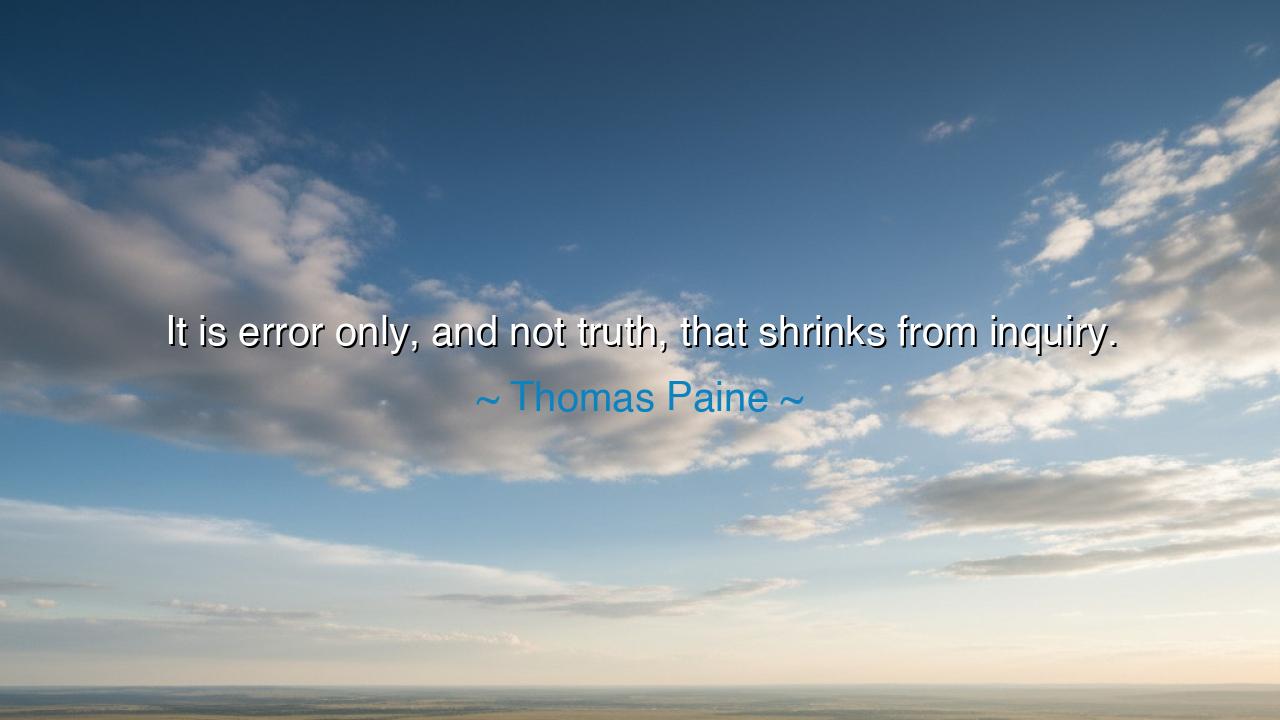
It is error only, and not truth, that shrinks from inquiry.






Hear the thundering words of Thomas Paine, the fiery pamphleteer of revolution: “It is error only, and not truth, that shrinks from inquiry.” In this declaration lies a sword that cleaves illusion from reality. For Paine knew that the light of questioning is not the enemy of truth but its ally. What is false recoils when examined; what is real stands unshaken. The cowardice of error is its own undoing, while the steadfastness of truth is its eternal crown.
The origin of these words is rooted in the Age of Reason, when Paine and his contemporaries sought to liberate mankind from superstition and tyranny. He lived in a time when dogmas demanded blind obedience and kings claimed divine right. Against these chains, Paine raised his voice: let all ideas be tested, let every belief face the fire of reason. For if they are true, they will endure. If they are false, let them perish, for no falsehood deserves the loyalty of free men.
Consider the trial of Galileo. When he proclaimed that the earth moved around the sun, the guardians of tradition silenced him, for their doctrine could not survive inquiry. They feared the telescope, they feared the question, they feared the light. Yet their repression proved Paine’s words: it was error, not truth, that trembled before investigation. The sun still rose, the planets still moved, and at last the truth prevailed, shining brighter for having been suppressed.
So too with the abolition of slavery. For centuries, empires defended this cruel practice with arguments of economy, tradition, even scripture. Yet when reformers asked the simple inquiry: “Are not all men created equal?”—the falsehood collapsed under its own weight. The defenders of slavery shrank from debate, knowing their claims could not stand the scrutiny of reason or the conscience of humanity. Again, Paine’s principle was proven: truth does not fear the question; only error does.
The lesson, O children of tomorrow, is this: never fear to ask, never fear to test. If what you hold is true, inquiry will only strengthen it. If it is false, better that it be torn away than clung to in blindness. The noble mind does not tremble before questions; it welcomes them, for it knows that all light only reveals more of reality. To fear inquiry is to confess weakness; to embrace it is to walk in the strength of truth.
Yet beware the comfort of easy answers. Many would rather rest in the sleep of tradition than endure the struggle of questioning. But comfort is not the same as freedom. To be free is to dare to inquire, to examine, to doubt until certainty shines. This path is not for the timid, but for the courageous, for it may strip away illusions long cherished. But what is lost in comfort is gained in clarity, and what is gained in clarity is the foundation of true strength.
Therefore, let your practice be thus: question boldly. Test the words of leaders, test the traditions of your fathers, test even the whispers of your own heart. Hold nothing above inquiry. For Paine has taught us that only error hides in shadows, while truth stands gladly in the sun. By living thus, you will not only free yourself, but help free all mankind from the chains of deception.
Thus remember and carry forward this wisdom: “It is error only, and not truth, that shrinks from inquiry.” Let it be your shield against manipulation, your sword against falsehood, your compass toward wisdom. For the one who loves truth need never fear the question, but only rejoice that each question brings him closer to the eternal light.






PPhoang phuong pham
I really like this quote because it emphasizes that truth can handle being challenged, whereas falsehoods fall apart under scrutiny. But is it possible that some ‘truths’ are so deeply ingrained that we may not even question them? What happens when we’ve accepted something as the truth for so long that we don’t even think to question it? Is there a way to remain open-minded and constantly challenge our assumptions without falling into doubt or cynicism?
NSThang Nguyen Sy
This quote makes me think about how people sometimes resist questioning certain things because they’re afraid of what they might uncover. But if truth really isn’t afraid of inquiry, does that mean we should be questioning everything? How do we navigate the fine line between skepticism and blind belief? Can we ever truly reach a point where we’ve uncovered all the necessary truths, or is truth always a journey of continuous exploration?
VD08. Pham Van Duc
I find this quote empowering, because it suggests that truth is not fragile or fearful, while error is something that hides. But what about when the truth is uncomfortable or inconvenient? Do we still want to seek it, or do we sometimes prefer the comfort of error, even if it’s false? How do we push through the discomfort that comes with questioning deeply held beliefs and opinions?
TAKha Ton An
Thomas Paine’s quote reminds me that errors, unlike truths, can’t stand up to thorough investigation. But is there ever a situation where something considered ‘truth’ might actually turn out to be wrong once fully examined? Can the pursuit of truth ever be endless, and how do we know when we’ve found something close to the truth? How do we ensure that our quest for truth doesn’t inadvertently become an exercise in justifying what we already believe?
THKim tuong Huy
I agree with the idea that truth doesn’t shy away from scrutiny, but sometimes people avoid questioning things because they fear the consequences of the truth. Does that mean we are often more comfortable in ignorance than in facing uncomfortable truths? How can we encourage more people to embrace inquiry and explore different perspectives without fear of the truths they may uncover? Can this process be painful, yet ultimately liberating?